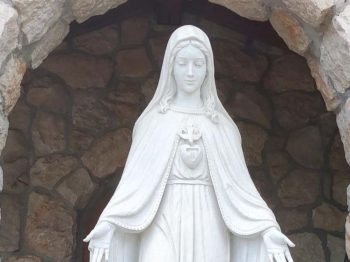One impact of reaching a higher tally of years myself, is a gradual facing the prospect of letting go of activity, or at least of over-activity! Religious women in general gain a deep sense of purpose and meaning from our apostolic work, grounded in the two-fold commitment of love for God and our neighbor. Over the years, I have listened to other older women share their feelings of loss of purpose and in some cases, almost a loss of identity when they can no longer reach out to others as part of the active mission of their congregation. The recent experiences we have all had of lockdown and the limits this imposes, present this dilemma to other age groups. This roadblock to what we have taken to be normal has to be ‘of God’ and I have looked to our specific tradition seeking some insights. While the stories of founders will differ greatly, maybe this time calls us all to reflect on the later years of important forerunners, where activity was denied them by ill health, or by some outside force, which left them unable to pursue the activities that had been so important to them. People like Father Pedro Arrupe spring easily to mind, but each congregation can think back to times when activity for whatever reason had to cease.
Most often, when we look at the life of Mary Ward (1585-1645), we talk about her vision for women, her missionary outreach, her courage. Her active years in this new endeavor were 1610-1630. The 1620s, especially, contain seemingly unending demands. Her main work in this period, after she and her companions walked to Rome, via the Alps with a detour to Loreto, was trying to meet and work with members of the Roman Curia, to convince them that “if they (men) would not tell us that we are but women, women might do great things.” She was convinced, after much prayer and discernment, that God wanted a congregation of active women, modelled on the Jesuit way of life, but self-governing, not under the local bishop or under a male ‘Father – General’. She envisaged a female leader directly responsible to the Pope, who would be responsible for directing the ministries of the sisters. She could show that the work they had done for ten years had born great fruit. She drew up documentation to support her claim; she met with representatives of governments and church, seeking people who would speak in favour of her project, which envisaged women teaching, doing pastoral work, and supporting the spiritual life of others. She saw this call as being clearly “of God”. She managed to meet with the Pope himself more than once. In an age where, despite much evidence to the contrary, women considered second-class and unable to take responsibility, Mary faced down gossip and ridicule, misunderstanding and detraction, from English Government spies, Jesuits, non-religious clergy, bishops and cardinals. All the while, she kept her finger on the pulse of her growing group of women, calling them as required to new postings in underground pastoral work in England, or in education and formation across Europe. She began small schools for girls in Rome, Naples, Munich, Bratislava and tried for the same in other cities. Given the communications and transport of the time, this is a formidable workload. Her letters show the pressures she was under, sometimes unable to finish a short note to a special friend, often admitting to one of her inner circle that she was unwell. Many years earlier in a retreat, Mary had prayed for the courage to accept whatever difficulties might occur in accomplishing God’s will in establishing this Institute – at that time she had been somewhat surprised to realize these might be greater than she had first thought. She had shared this retreat experience with her companion Winifred Wigmore, and in 1626, she wrote to her friend saying that she realized that the “long loneliness” might be near. She adamantly believed that this work entrusted to her by God would continue: her letter to Pope Urban in November 1629 reasserts this deep belief. Her followers had built their lives around her unwavering trust in the God who called.
And suddenly, in 1630, it all stops. Forbidden to even farewell her community, she is arrested and imprisoned by ecclesiastical decree. She is at death’s door. Her whole mission is in ruins. The reply from Rome- not just simply, ‘you cannot call yourselves religious women’, but the whole enterprise, “a poisonous growth in the church of God,” is “suppressed, extinct, rooted out, destroyed and abolished”. She is refused the sacraments. Called a heretic. Yet even from this dark and smelly cell, she calls for calm, for trust that God is over all – and she finds creative ways to circumvent petty restrictions so she can communicate with her companions via letter written in lemon juice- she and her companions draw on skills honed in the years of persecution of their families because of the Catholic faith in Protestant England.
A truly long loneliness stretched ahead of her… fifteen years was to pass by before she died in 1645. Having tapped networks, which informed the Pope of her imprisonment, she was released. Her recovery in Munich was slow and overshadowed by her summons to Rome to face possible death either through illness or the Inquisition. She gained an audience with the Pope and was cleared of the charge of heresy, but the first few years in Rome resembled a form of ‘lockdown’, with church spies at the doors reporting on every move and trying to intercept letters. Her health was in ruins. Her women almost everywhere had been turned out of their convents, in the midst of the Thirty Years War. All money from dowries invested in previous housing was lost with this expulsion. Some made their way to Rome. The few there had to try to contact others- and deal with the pain that so many were unaccounted for; face abject and humbling poverty, dependent on others to send food and avoid the obstruction and interference from those who had plotted to bring her down. Internally, she no doubt had to grapple with the total failure of the enterprise God had entrusted to her, and in this maintain her trust that God was somehow over it all. In these years she can no longer call herself a religious sister. She has no mission to offer her fragmented remnant of women. She can only seek ways to encourage them and keep in touch. Her letters, those that remain despite having crossed lines of war and church spies, not to mention the subsequent four-hundred years of ecclesial suppression and the destruction via political upheavals and wars, show a tenderness for the few remaining companions, who cope with so much ill-will and confusion. She maintained her responsibility for them as friends, no longer able to claim any church sanctioned leadership role.
In 1634 she was eventually permitted to visit an Italian spa for health reasons and even there was followed by spies, yet ‘spiritual conversations’ with her supported those secular women and men drawn to share their stories with her. Her ministry became one of welcoming people, listening, showing her care through a quiet presence rather than being able to actively work for change. Finally, in 1637 her small group began their rather drawn out return to England, via another Spa, not through more familiar German speaking territory because of the brutal ongoing war, but via France. Her journey was made doubly problematic by extreme ill health. No longer walking 20 miles a day as in her younger years, but mostly dependent on public or private carriages, sometimes offered overwhelming hospitality by wealthy contacts, other times having to beg en route, as from the English Benedictines in Paris; passing through very dangerous territory, awash with deserting soldiers and brigands lying in wait for poorly guarded travelers. Ill-health- kidney stones, fevers, and other ailments kept them for months in Liege. She arrived in London in 1639 and dared to respond to calls from parents to help educate their daughters in the heart of Protestant London. Civil war broke out and she and her party joined the probably disorganized retreat to York, accompanying the Royalists, who eventually lost the war. She was an internal refugee in the country she loved so much, however this journey did lead her into her home territory for the first time perhaps since she had left in 1605. This civil war continues to wage around her on the way north, around the house they were offered some distance out of town, in the small village of Hewarth, and finally in the town of York itself, which soon capitulated to the enemy. When they returned to Hewarth in mid-1644, it was to a ravaged house, air thick with the evidence of hundreds of bodies of buried soldiers, all trees cut down and “the roof unleaded” with the iron from all windows and doors removed.
The shift was
massive – from activity to inactivity, from independence to dependence, from a
clear purpose to making-do within restrictions. We do not have extensive prayer
journals but only a few jottings from this time. One can only imagine that
Ignatius’ exercise of choosing and accepting being poor and despised as Jesus
was, would have meant much to her. In 1615 in prayer, she saw clearly that freedom
to refer all to God, justice as right relations with God and others, and the sincerity
to show oneself as one truly is, when grounded in trust in God would enable her
company to walk as friends with God . By the 1630s, this insight had deepened
so that she saw how it embraced the cross. She wrote a note in 1636, which confirms this:
“O how well ordered are thy deeds, my Lord God.
Then thou saydst that justis was the best disposition,
Now thou shouest how such justis is to be gotten.”
Despite this failure and ‘crucifixion’, we know that her felicity, which showed itself in her good natured, supportive, caring joy, continued to prevent her group from disintegrating into depression. The Brief Relation tells us that “Her confidence and cheerfulness was so humble, peaceful and communicative to others.” Even near death, she told them not to be sad and tried to cheer them by singing herself. She urged them not to give up, but to treasure God’s vocation in them that it be “constant, efficacious and affectionate, which last word came with particular accent…”
What can we, facing old age today or a more enclosed horizon, draw from these years of letting go? No doubt a call to bring pain, loss of dear friends, uprooting from what had been normal, total uncertainty as to the future, to our prayer so these can be welded into an acceptance through a deepening encounter with God. The ‘Friend of friends’ that she trusted is the one to whom we must entrust our confusion, our struggle, our hope. She offers us a wisdom that showed itself in not allowing the troubles of the day to become her only focus. Her trust that God was in charge lightened her spirit: she did not have to anguish if whatever was happening was beyond her control. Her readiness to start again after all she had been through, her loving support of others, her positive attitude to life, all encouraged them to keep going even after her death. Her belief in the future, despite the condemnations she had lived through and all evidence that was against any future, her refusal to allow bitterness to have any place, rather praying with generosity for her enemies, her stress on living our vocation affectionately…. what warm and hopeful words to inherit from a founder! The value of communication – be it only a short note – which let others know they were being thought about, the fact that she received graciously the efforts of Pope Urban to provide for her, despite all he had done and allowed to be done, these point to a generosity of spirit and an outward focus, which refused to allow her to be broken by the experiences of this last ‘long loneliness’.
All these seem to me to be grounded in her unshakeable conviction that God was her ‘Friend of all friends’. As we look at the mounting negatives in our time: climate change, the dismantling of democratic rights, the violence of human trafficking, drugs, war-mongering, overlaid with the pandemic that has killed so many and changed our perspective on travel, employment, aged-care, freedom; and a church which finds it almost impossible to rethink old structures and practices and find new ways, it seems that the call is to do what we can where we are, trusting that, invisible to us, new life is being nourished. We are called to let go into freedom with God, doing the little that in us lies, to put some small amount of yeast into the bread that is in process of being baked in our time. Who knows, it might help feed many in the centuries ahead.










